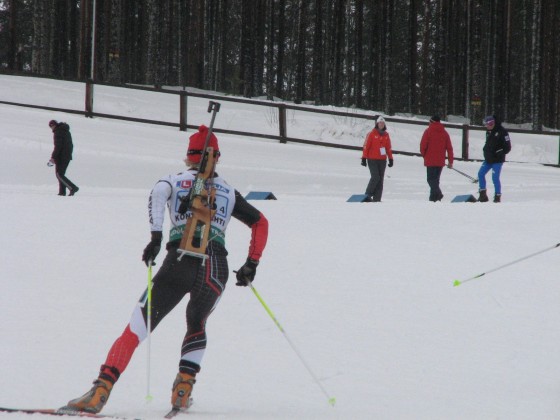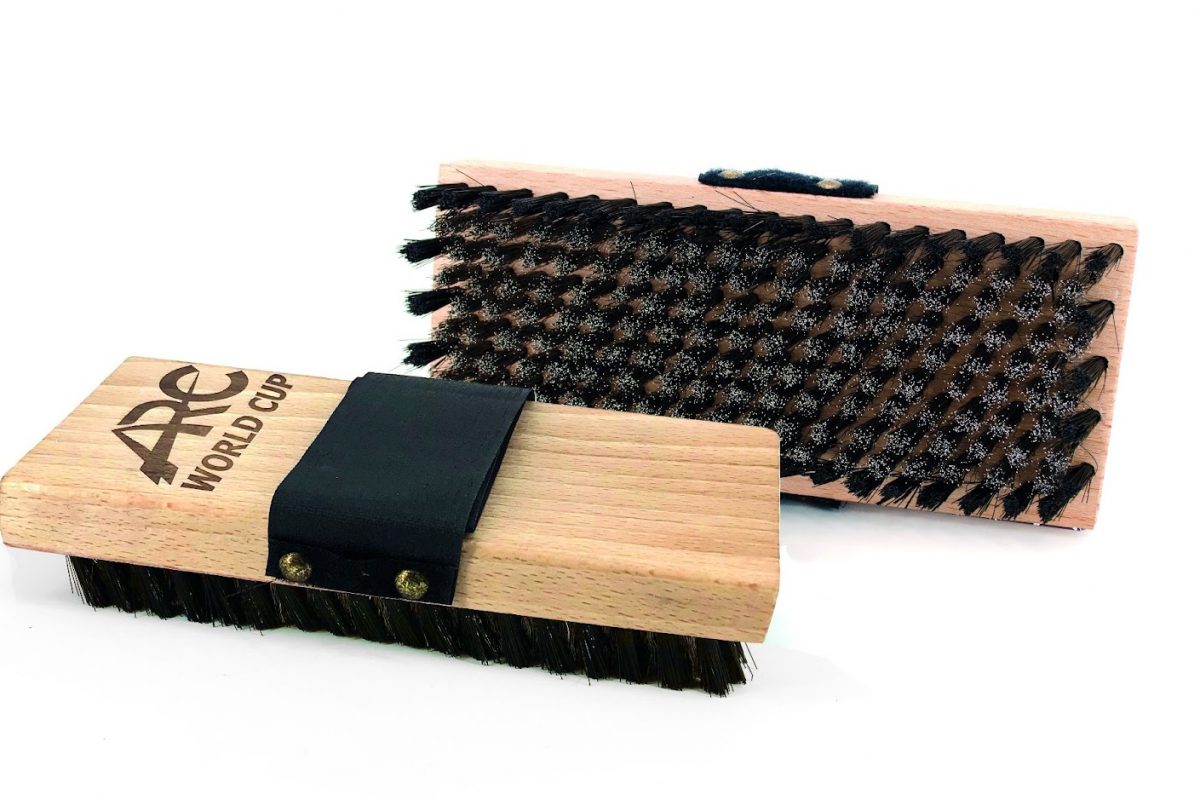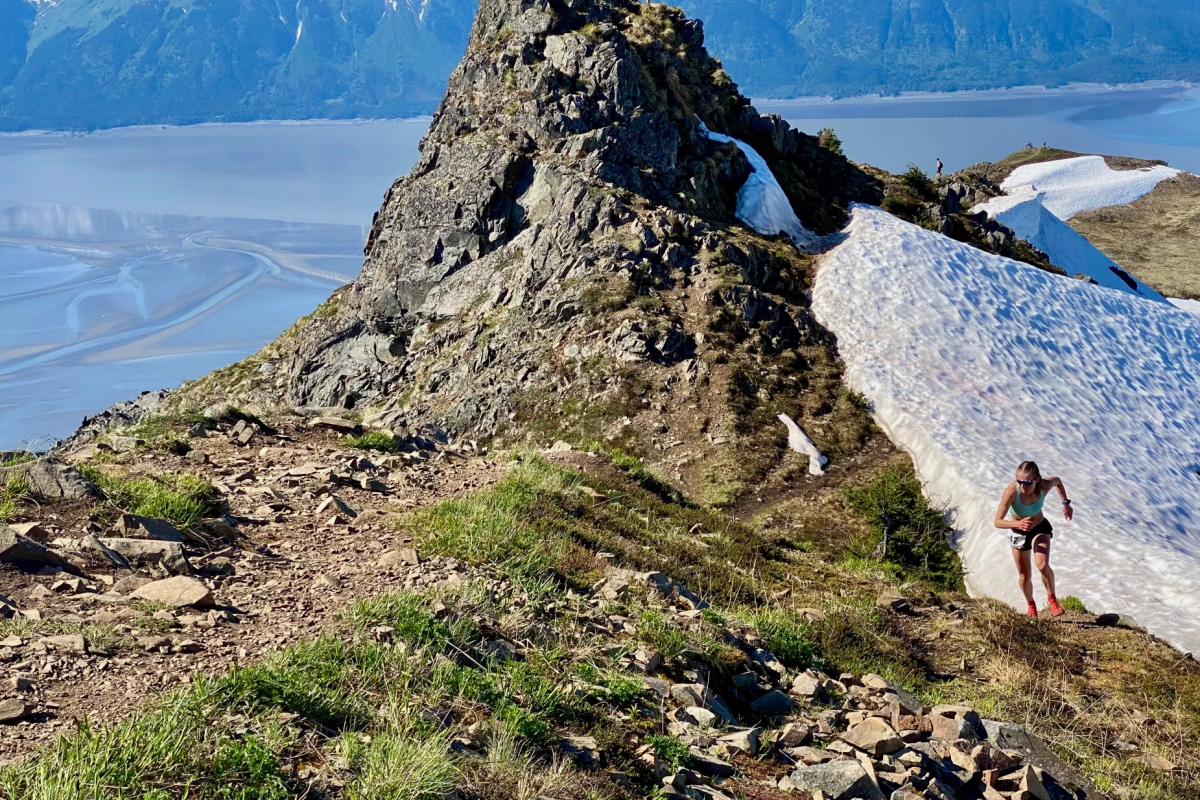
After taking a year off from biathlon, coming back to win his first World Championship, and then graduating from the junior ranks, last year was a bit of a whirlwind for Canada’s Kurtis Wenzel.
And then, he was faced by a challenge familiar to all newly-senior North American biathletes: what do you do next? With many teammates who already have World Cup or even World Championships experience and a small number of lightly-attended NorAms, it’s sometimes a challenge to find racing opportunities and stay motivated.
Luckily, Biathlon Canada has been sending more athletes to second-tier IBU Cup races in Europe, and in February Wenzel hit the circuit, where he stayed for the next several weeks.
Then, some good news, and the end of the season began to take off. Wenzel got the surprise call to go to Sochi, Russia, to compete in his very first World Cup – at next year’s Olympic venue. The he flew home and competed in national championships, earning his first title as a senior. Not a bad way to wrap up a season that had its downs as well as its ups – for instance when Wenzel got sick in Bansko, Bulgaria, and missed every race of Open European Championships.
Olympic Preview
To say that the Sochi trip was last-minute would be an understatement. It wasn’t always clear that the team would even bring four men to the venue, much less that Wenzel would be one of them.
“I wasn’t really picked out to test the new venue, more just to secure four start sports,” Wenzel explained to FasterSkier in an interview. “Biathlon Canada received a grant for that specific reason from the Canadian Olympic Committee. Without the grant I would have had to pay my own way for two weeks in Europe just for one race, which would have been hard for me to justify. I wasn’t the first choice for the spot either: Marco Bedard turned down his spot due to some tendon problems and Nathan Smith had just got back to Canada when they found out about the grant.”
The Canadians were trying to make it into the top 15 of the year’s Nations Cup standings, which would secure them four starting positions on the World Cup, as opposed to the three they had for men this year. Since relays count heavily in the scores, the team had secured the grant to send a full relay team to Sochi, even if Wenzel wouldn’t have a spot in any of the individual races.
“I found out I would be coming to do the WC8 relay just before European Championships in mid-February,” Wenzel said. “I had to go on my own to Munich for five days to get my Russian visa… Sochi was my last stop on a tour that began mid January and I was feeling incredibly run down. I was sick at European Championships in Bulgaria and it was a big struggle to get myself feeling like I could race again. I actually requested they send another athlete to take my place, but it was too late to change everything at that point.”
So in some ways, his big debut did not go as planned, at all. The whole team was feeling a little under the weather; several of the men suggested at the time that they had been much stronger early in season and their ski form was simply gone. The team failed to score points in either the individual or the sprint, and placed 15th in the relay, one spot behind Belarus. The two teams had been dueling for the top-15 position all season, and Belarus ended up getting it, leaving Canada with a three-man quota again next season.
“I was certainly unhappy with my ski form, which is not at World Cup level at the moment,” Wenzel said. “However, my shooting was satisfactory and saved me from losing more time off the leaders… Our goal was to secure a top 15 overall World Cup ranking and I was not able to hold up my end of that.”
The team had started out in 17th after Jean Philippe Le Guellec struggled on the shooting range; Scott Gow pulled Canada up to 13th before Gow took his turn, tagging off to Scott Perras who held 15th. Even if his skiing was below par, Wenzel held his own on the range, using a single spare round. That showed he could handle the pressure of perhaps the most stressful event on the World Cup circuit.
“It wouldn’t say it was ‘over’ whelming for me to race in Sochi,” he joked. “I think it was just the right amount of ‘whelming’. Apparently I can keep my cool in these kinds of situations.”
And, the 22-year-old now has a bit more experience that will surely help him in the future.
“It was an amazing experience,” he said. “I have always wanted to race in front of big packed stands and I feel lucky I got to do it at one of the most epic venues imaginable. The venue is the biathlon temple of Russia. The trails are some of the hardest I have ever seen.”
And just in case he gets the call for next year’s Olympics – where Canada will have four starting spots – he knows what to expect from a venue that was universally described as great, but strange.
“There is a stark contrast between the original dwellings in Krasnaya Polyana, the new hotels and Olympic village,” Wenzel said to add his own description. “Imagine a glorious winter resort built from nothing with no history of skiing in a short time. In Russia they truly believe that if you build it, they will come. There were lots of enthusiastic fans and volunteers excited to be a part of something so big. I was glad they all got to see the home team pull through for the men’s relay.”
On To Nationals
Like most of the other North American national championships in the nordic disciplines, Canadian biathlon nationals – which this year doubled as North American Championships – is not attended by most World Cup athletes. But the event, held in Whistler this year as part of the Sea to Sky Festival which also included Ski Nationals, allowed Wenzel to go head to head with some of his rivals for World Cup starts.
He wasn’t sure how things would go.
“I was expecting bad jet lag and a repeat of the exhaustion I felt while on tour in Europe, but coming back to Canada after two months abroad really perked me up,” he said. “I wasn’t in great ski shape, but it was good enough and my shooting mentality was spot on. It was the right combination of wanting to hit targets and not worrying about it.”
Wenzel started the series off with clean shooting, finishing second in the sprint to Smith by 59 seconds to earn a silver medal. That normally would have put him in a tough place in the pursuit, skiing alone with little chance of catching the World Cup veteran; but racing in North America is often different than in Europe, where pursuits are started based on time gaps from the sprints.
“The pursuit was actually a special NorAm circuit start where everyone goes at 5-second intervals based off their sprint race ranking,” Wenzel explained. “This gave me hope that I could beat Nathan up until the middle of the race where he opened up a gap from skiing and shooting much faster then me.”
But, although Wenzel didn’t know it, Smith had started early and was given a 30-second time penalty. So it was a good thing that the younger racer kept his cool, hit all 20 targets – making him 30 for 30 for the weekend – and stayed focused.
“I was actually still very close to catching him,” Wenzel said. “He missed two at the last shooting and I was able to stay clean which put me out 10 or 15 seconds behind him without the penalty. He tried his best to open that up to 30 seconds to overcome his penalty but I held on for the win! Most of the race I was just focused on holding on to second place so it was a big surprise when I found out I won.”
Even though it was his first year as a senior racer, it wasn’t his first time in the open class at nationals. So Wenzel had come into the weekend knowing what was possible, but also cautious and doubtful that it could happen.
“I raced up and competed as a senior last year at nationals and earned a bronze medal,” he said. “I know I had it in me to win at Nationals, but I was surprised I pulled it out after being out of shape for so long.”
Wenzel finished off the weekend by placing fourth, the third Canadian, in the mass start, which Smith won. He then joined forces with Smith and World Cup racer Rosanna Crawford to win the mixed relay for Alberta.
Despite the slow ski shape, Wenzel continued on with his race season, competing in two races at ski nationals; in his year away from biathlon, he had focused on skiing, so in some ways that was a return, too. Tired, he placed 50th in the 10 k skate and 39th in the 50 k marathon.
But of all the events in Whistler, it was unsurprisingly the national championship that stood out.
“I have had some chances to beat Marco and Nathan this year besides nationals,” Wenzel said. “At trials for IBU Cups 6 and 7 I won against Marco in the sprint and at an Alberta cup in January I was able to beat Nathan as well. I have to say, even with the unusual circumstances, doing it at Nationals was much more satisfying! It was a perfect way to end the season.”
Chelsea Little
Chelsea Little is FasterSkier's Editor-At-Large. A former racer at Ford Sayre, Dartmouth College and the Craftsbury Green Racing Project, she is a PhD candidate in aquatic ecology in the @Altermatt_lab at Eawag, the Swiss Federal Institute of Aquatic Science and Technology in Zurich, Switzerland. You can follow her on twitter @ChelskiLittle.



